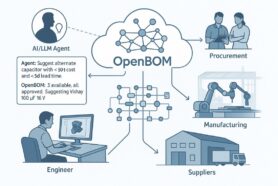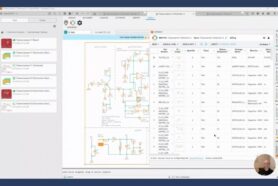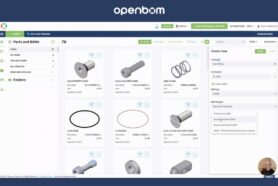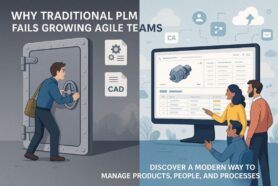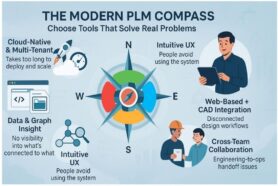
In the world of engineering and manufacturing, complexity is growing significantly across various aspects of product development, product lifecycle management, and supply chain management. From complex product designs to complex development processes and complex supply chains, organizations need to deal with multiple challenges that demand better PLM software and solutions to support product lifecycle. A traditional PLM system (Product Lifecycle Management), while once seen as a silver bullet, usually replaced these challenges with its own “PLM” complexities, high costs, and limited adaptability. That was extremely visible, in particular, for smaller enterprises and new product development initiatives.
CIMdata, one of the leading analytical and service companies, presented the results of their annual PLM market survey and displayed what managers think about PLM. A shocking 17% of companies could not work without PLM. It portrays the size of the challenge with existing PLM systems and technologies. The conclusion is clear and presented by leading CIMdata analysts – Peter Bilello and Stan Przybylinski.
At OpenBOM, we are taking a fresh look at solving challenges for engineering teams and manufacturing companies. The main problem of the modern engineering environment is complexity. Let’s talk about various aspects of complexity in engineering and business systems.
Complexity Challenges in Engineering and Manufacturing
After discussing the topic of complexity with many engineers and manufacturing businesses, we can see various aspects of complexities. Here are three primary complexity types:
- Complexity of Products: Modern products are increasingly sophisticated, integrating advanced technologies and complex mechanical, electronics, and software assemblies and systems. Managing the complexity in products requires robust systems that can handle detailed product structures (multi-disciplinary BOMs), precise engineering data, and seamless collaboration across teams.
- Complexity of Product Development Processes: Bringing a product from concept to market involves navigating through numerous stages and iterations. Coordinating design changes, ensuring regulatory compliance, and maintaining version control are critical but often daunting tasks that can slow down innovation and time-to-market. Traceability is a key element in solving the complexity of product development processes.
- Complexity of Supply Chain: Globalized supply chains add layers of complexity, involving multiple vendors, fluctuating costs, and varying regulatory requirements. Efficient supply chain management demands transparency, agility, and effective communication to mitigate risks and optimize procurement processes.
5 Critical Problems
One of the main reasons for the low trust in legacy PLM systems from the side of manufacturing is a misalignment of expectations and values. They were too cumbersome to set up, prohibitively expensive to license, and sometimes failed to deliver sufficient value, particularly for small to medium-sized enterprises (SMEs) and new product development initiatives. Moreover, these PLMs primarily focused on engineering release processes for large enterprises, often neglecting the critical connection points with procurement and other essential functions. To sum up, traditional PLM (Product Lifecycle Management) systems, once presented as a future in many organizations, often fell short for many organizations and were limited to use by engineering organizations only.
What is a possible way to reset the status quo? At OpenBOM, we went back to the roots and talked to many engineers, operational managers, procurement and supply chain teams. We asked them about urgent, painful, and important problems. We are building a new type of platform that allows to manufacturing companies and engineering teams to work differently. It is not an overnight change. The platform and tools also cannot be built overnight. We put a flexible data model, multi-tenant architecture, openness, integrations and real-time collaboration as main technological differentiators of OpenBOM. We created an integrated agile new product development process support. Here is a short summary about how OpenBOM helps to solve fundamental problems in engineering teams and manufacturing companies already today.
1. Simplifying Complex Bill of Materials (BOM) Management
Managing complex product data models (digital BOMs) across multiple disciplines can be error-prone and time-consuming. OpenBOM’s simple, yet robust graph-based data model changes this process by providing a unified platform for the seamless creation, management, and sharing of multi-disciplinary BOMs and BOM types (EBOM, MBOM, SBOM, etc). This flexible and powerful approach ensures accuracy, reduces errors, and enhances collaboration among stakeholders.
2. Streamlining CAD Integration and product structure (BOM) Creation
Creating BOMs from multiple CAD systems with derivative files and related information is notoriously challenging. OpenBOM simplifies this task by integrating directly with CAD systems (both desktop and cloud), automating BOM creation, and ensuring all relevant files are accurately included. This integration saves time, enhances data reliability, and supports efficient design iterations and manufacturing processes. The updates are seamless and data is connected and associated directly with design systems and product development process. Check more in OpenBOM Design Digital Thread article.
3. Enhancing Order Management: RFQ, PO, and Inventory
Often overlooked in PLM, procurement, and supply chain (especially during the NPD stage as well as in prototyping and custom development). Alignment between engineering requirements and vendors, purchases and stock is tricky and very painful Navigating RFQ, PO, and inventory processes can be complex and cumbersome. When it is disconnected from the engineering process it leads to complexity and mistakes. OpenBOM agile new product development methods streamlines these operations within a single platform, enabling teams to generate RFQs, track POs, manage inventory levels, and maintain clear visibility throughout the procurement lifecycle. This simplification reduces administrative burdens and improves operational efficiency.
4. Ensuring Accurate Data Transfer to ERP Systems
Accurate data synchronization between CAD, BOMs and ERP systems is crucial for operational continuity and decision-making. While the question of “moving data from CAD to ERP” is often asked, companies are experiencing difficulties in setting a process to integrate PLM and ERP functions. OpenBOM facilitates seamless integration with ERP platforms, automating data transfer and minimizing manual errors. The foundation of this process is a novel product model and the mechanism for capturing data. Open API and automatic data extraction is the foundation of this level of efficiency. This integration ensures timely updates across the organization, enhancing resource planning and operational effectiveness.
5. Facilitating Seamless Collaboration with Contract Manufacturers
Effective collaboration with contract manufacturers hinges on precise data exchange and clear communication. OpenBOM facilitates this collaboration by enabling engineering teams to share detailed BOMs and documentation securely. Contract manufacturers receive up-to-date information, ensuring alignment with design specifications and accelerating time-to-market for products.
Adapting to Your Needs: Complementing Existing PDM or Providing a Comprehensive Solution
It is important to speak about PDM systems and design data management. OpenBOM realizes that for many companies, PDM is still not a solved problem. Although CAD companies have been providing integrated PDM systems for the last 20+ years, the modern engineering environment brings a new level of challenges – distribution, multiple teams and disconnect.
OpenBOM either integrates with existing PDMs or offers flexible solutions tailored to diverse organizational needs. Whether teams require simple CAD file management capabilities combined with robust storage systems and efficient file lock with check-in/out, OpenBOM Design Projects can help you. Alternatively, OpenBOM integrates with existing PDM systems or directly with cloud CAD/PDM bundles. This adaptability enhances productivity and collaboration across the product lifecycle.
This is just a start. We understand the value of live online connected platform and we continue to build it to increase value of our solution for engineering teams and manufacturers.
Conclusion:
We remember how important it is to address painful, urgent, and important problems. OpenBOM addresses five critical challenges faced by engineering teams and manufacturing companies, empowering them with enhanced efficiency, accuracy, and collaboration capabilities. By simplifying BOM management, optimizing CAD integration, streamlining order processes, enabling ERP synchronization, and facilitating seamless collaboration with contract manufacturers, OpenBOM supports innovation and sustainable growth in competitive markets. Embrace OpenBOM to overcome challenges and unlock new possibilities in engineering and manufacturing excellence.
REGISTER FOR FREE and check how OpenBOM can help you.
Best, Oleg
Join our newsletter to receive a weekly portion of news, articles, and tips about OpenBOM and our community.




